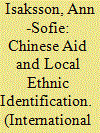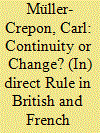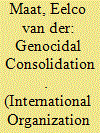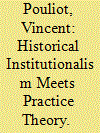|
|
|
Sort Order |
|
|
|
Items / Page
|
|
|
|
|
|
|
| Srl | Item |
| 1 |
ID:
175818


|
|
|
|
|
| Summary/Abstract |
Recent empirical evidence suggests that Chinese development finance may be particularly prone to elite capture and patronage spending. If aid ends up in the pockets of political elites and their ethno-regional networks, this may exacerbate ethnic grievances and contribute to ethnic mobilization. In this research note I examine whether Chinese development projects make local ethnic identities more salient in African partner countries. A new geo-referenced data set on the subnational allocation of Chinese development finance projects to Africa is geographically matched with survey data for 50,520 respondents from eleven African countries. The identification strategy compares sites where a Chinese project was under implementation at the time of the interview to sites where a Chinese project will appear subsequently. The empirical results suggest that living near an ongoing Chinese project makes ethnic identities more salient. There is no indication of an equivalent pattern when considering other donors’ development projects.
|
|
|
|
|
|
|
|
|
|
|
|
|
|
|
|
| 2 |
ID:
175814


|
|
|
|
|
| Summary/Abstract |
Current political order in Africa is often linked to legacies of colonialism, in particular to legacies of indirect colonial rule. However, evidence about the application of indirect rule is scarce. In this paper I argue that empire-level characteristics interacted with precolonial institutions in shaping the indirectness of local rule. First, British governments ruled more indirectly than French administrations, which followed a comparatively centralized administrative blueprint, came with a transformative republican ideology, and had more administrative resources. Empirically, I find that French colonization led to the demise of the lines of succession of seven out of ten precolonial polities, twice as many as under British rule. Second, precolonial centralization was a crucial prerequisite for indirect rule. Local administrative data from eight British colonies show that British colonizers employed less administrative effort and devolved more power to native authorities where centralized institutions existed. Such a pattern did not exist in French colonies. Together, these findings improve our understanding of the long-term effects of precolonial institutions and draw attention to the interaction of characteristics of dominant and subordinate units in shaping local governance arrangements.
|
|
|
|
|
|
|
|
|
|
|
|
|
|
|
|
| 3 |
ID:
175820


|
|
|
|
|
| Summary/Abstract |
As more women attain executive office, it is important to understand how gender dynamics affect international politics. Toward this end, we present the first evidence that gender stereotypes affect leaders’ abilities to generate audience costs. Using survey experiments, we show that female leaders have political incentives to combat gender stereotypes that women are weak by acting “tough” during international military crises. Most prominently, we find evidence that female leaders, and male leaders facing female opponents, pay greater inconsistency costs for backing down from threats than male leaders do against fellow men. These findings point to particular advantages and disadvantages women have in international crises. Namely, female leaders are better able to tie hands—an efficient mechanism for establishing credibility in crises. However, this bargaining advantage means female leaders will also have a harder time backing down from threats. Our findings have critical implications for debates over the effects of greater gender equality in executive offices worldwide.
|
|
|
|
|
|
|
|
|
|
|
|
|
|
|
|
| 4 |
ID:
175816


|
|
|
|
|
| Summary/Abstract |
Under conditions of guerrilla conflict, mass indiscriminate violence has been shown to effectively starve a guerrilla of its support. Consequently, counter-guerrilla mass violence is concentrated within territories where a guerrilla is dominant. However, in roughly 40 percent of mass violence episodes (e.g., Rwanda and Cambodia), the violence was aimed at populations within areas of secure territorial control. These episodes have therefore been explained by attributing ideological preferences to leaders or as unique cases only. I argue that leaders adopt mass indiscriminate violence against outgroups to consolidate power under conditions of elite rivalry. The violence serves two main goals. First, it helps build coalitions with constituencies that gain from violence; and second, it targets rival factions indirectly by forcing local security officials to facilitate or oppose the violence. The violence thereby provides rival supporters with an exit option, provides the regime with information on rival supporters’ private loyalties, and undermines rivals’ abilities to mount an effective resistance. These rivals can ultimately be purged from the regime. Based on newly collected original data on elite purges and on the type of mass indiscriminate violence for the years 1950 to 2004, I show that this type of mass violence, which I call “genocidal consolidation,” is intimately connected to authoritarian consolidation.
|
|
|
|
|
|
|
|
|
|
|
|
|
|
|
|
| 5 |
ID:
175815


|
|
|
|
|
| Summary/Abstract |
The selection process leading to the appointment of Antonio Guterres as Secretary-General of the United Nations gave way to unprecedented practices in world politics, such as public hearings with candidates. A textbook case of what historical institutionalism calls “layering,” this episode of institutional development features intriguing puzzles, including its timing, form, and limits. Drawing on historical institutionalism and practice theory, I develop a “pulling” theory of agency that complements intentionalist accounts. The webs of practices that agents find themselves in afford certain actions over others, orienting the push of interests. I infer three mechanisms—relational crossover, competence transfers, and pushback—and show how a set of nine practices, available at the UN in 2015–2016 but not in earlier episodes, account for the specifics of the recent renewal of the Secretary-General's selection procedure. A full explanation of this critical case of institutional change is impossible without understanding how agents struggled with one another under the pull of the UN web of practices, affording some innovations but not others.
|
|
|
|
|
|
|
|
|
|
|
|
|
|
|
|
| 6 |
ID:
175813


|
|
|
|
|
| Summary/Abstract |
How do powerful states control international organizations (IOs)? In contrast to the conventional wisdom that treats weighted voting rules as the primary means that powerful states use to codify their asymmetric control in institutional design, we propose that funding rules are equally important. Our framework develops a logic of substitution whereby permissive earmark rules—that allow donors to stipulate how their contributions to an IO are used—are a design substitute for weighted voting from wealthy states’ perspective. Whether asymmetric control is incorporated in design through voting or funding rules depends on whether egalitarian norms emphasizing political and legal equality, or shareholder norms emphasizing influence commensurate with financial power, govern voting and representation rights at the IO. Focusing on the domain of climate finance, we demonstrate that weighted voting rules are used at international climate finance institutions (ICFIs) associated with multilateral development banks, but that wealthy states pursued permissive earmark rules at ICFIs within the United Nations system where egalitarian norms are strong. In this way, powerful donors can exert control over resource allocation even when developing states appear to hold equal influence on governing bodies. In addition to providing a reassessment of how power translates into control at IOs, our framework offers insight into forum-shopping behavior and sheds light on substitution dynamics that involve other dimensions of design across a range of issue areas.
|
|
|
|
|
|
|
|
|
|
|
|
|
|
|
|
| 7 |
ID:
175817


|
|
|
|
|
| Summary/Abstract |
Do peacekeepers protect civilians in civil conflict? Securing civilian safety is a key objective of contemporary peacekeeping missions, yet whether these efforts actually make a difference on the ground is widely debated in large part because of intractable endogeneity concerns and selection bias. To overcome these issues, we use an instrumental variables design, leveraging exogenous variation in the rotation of African members of the United Nations Security Council and looking at its effects on African civil wars. We show that states that wield more power send more peacekeepers to their preferred locations, and that these peacekeepers in turn help to protect civilians. We thus demonstrate the robustness of many existing results to a plausible identification strategy and present a method that can also be applied to other diverse settings in international relations.
|
|
|
|
|
|
|
|
|
|
|
|
|
|
|
|
| 8 |
ID:
175812


|
|
|
|
|
| Summary/Abstract |
Preferences for conflict and cooperation are systematically different for men and women: across a variety of contexts, women generally prefer more peaceful options and are less supportive of making threats and initiating conflict. But how do these preferences affect states’ decisions for war and patterns of conflict at the international level, such as the democratic peace? Women have increasingly participated in political decision making over the last century because of suffragist movements. But although there is a large body of research on the democratic peace, the role of women's suffrage has gone unexplored. Drawing on theory, a meta-analysis of survey experiments in international relations, and analysis of crossnational conflict data, we show how features of women's preferences about the use of force translate into specific patterns of international conflict. When empowered by democratic institutions and suffrage, women's more pacific preferences generate a dyadic democratic peace (i.e., between democracies), as well as a monadic peace. Our analysis supports the view that the enfranchisement of women is essential for the democratic peace.
|
|
|
|
|
|
|
|
|
|
|
|
|
|
|
|
| 9 |
ID:
175819


|
|
|
|
|
| Summary/Abstract |
A key piece of conventional wisdom among scholars of modern armed conflict is that collateral damage is often strategically costly in war. Yet most combatants already know this and take actions after mistakes—most prominently, the distribution of “condolence payments” to civilian victims—in order to mitigate these costs. Do these payments work? This question is important not only for policymakers but also for deeper theoretical debates about how civilians respond to combatant signals in war. To examine these issues, I use micro-level conflict event data on 4,046 condolence payments made by Coalition forces to civilian victims during the Iraq War from 2004 to 2008, matching it with corresponding data on collateral damage and insurgent violence. The results of this analysis reveal that post-harm compensation does significantly diminish local rates of insurgent violence, and that this is true across different types of payments (cash handouts or in-kind assistance). Ultimately, these patterns can be best explained by a rationalist mechanism in which civilians update their beliefs about violent events based on new information about combatants’ wartime intentions. The results thus provide a compelling strategic rationale for combatants to compensate their victims in war, and suggest that civilians are not blinded to new information about conflict dynamics by their preexisting biases.
|
|
|
|
|
|
|
|
|
|
|
|
|
|
|
|
|
|
|
|
|